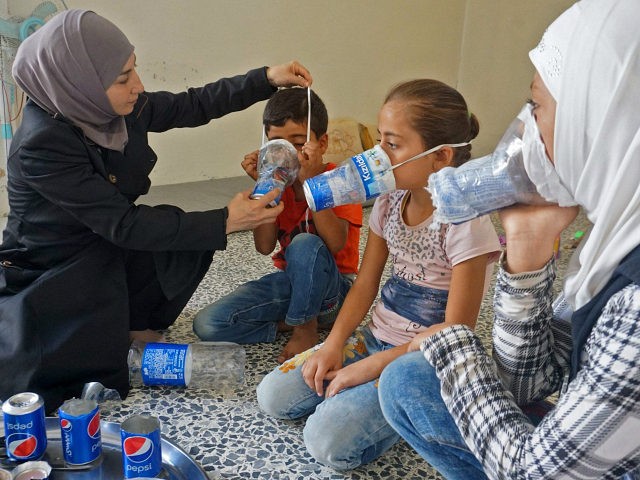United Nations war crimes investigators reported on Wednesday they have uncovered more evidence that Syrian dictator Bashar Assad used chlorine gas weapons against civilians on three occasions — one of them in the northwestern province of Idlib, where the U.N. fears Assad and his Russian allies will soon massacre civilians in a massive assault.
“The Commission of Inquiry demands that all parties to the conflict and those states who support them do everything in their power to prevent a massacre in Idlib,” U.N. investigators said in their Wednesday statement, signaling the urgency of the situation in that besieged province.
The investigators said they had no hard evidence Assad plans to use chemical weapons in the Idlib assault, but the United Nations, United States, and European powers have spared no effort warning Syria and Russia that weapons of mass destruction will not be tolerated.
U.S. envoy to Syria Jim Jeffrey said last week there is “lots of evidence that chemical weapons are being prepared” for Idlib.
President Donald Trump’s national security adviser John Bolton warned Assad on Monday that if he uses chemical weapons in Idlib, he will face a “much stronger” response than the two punitive strikes already conducted by the United States.
“I can say we’ve been in consultations with the British and the French who have joined us in the second strike and they also agree that another use of chemical weapons will result in a much stronger response,” Bolton said.
U.N. Ambassador Nikki Haley and Secretary of Defense Jim Mattis also gave warnings Tuesday against the use of chemical weapons in Idlib. Mattis characteristically refused to specify exactly what the U.S. is planning to do if Assad drops gas bombs.
“I’m not going to tell the world ahead of time what we’re going to do. It’s just not my style. I never talk about what would come next, but I think that you do have to look at the fact that we will abide by the chemical weapons prohibition and support it,” said the Defense Secretary.
German Chancellor Angela Merkel said on Wednesday that Germany will not ignore the use of WMD in Idlib and has not ruled out the possibility of military action against Assad to prevent it. Germany’s Defense Minister Ursula von der Leye stressed the importance of establishing “credible deterrence” against chemical weapons, fearing Assad has already established the precedent that brutal tyrants can get away with using them.
U.K. Foreign Secretary Jeremy Hunt discussed possible responses to Syrian chemical weapons deployment with U.S. Secretary of State Mike Pompeo on Tuesday.
“If the regime in Syria repeats its horrible use of chemical weapons then our response will be strong and united,” Hunt promised.
French Foreign Minister Jean-Yves le Drian went even further on Wednesday and said, “there appears to be some sort of psychological preparation for a chemical attack by Russian groups,” by which he meant the Russian propaganda machine is gearing up to blame gas attacks in Idlib on rebel forces.
“If Russia takes the risk of backtracking on its commitment to help stabilize Idlib province, it also takes the risk of finding itself completely alone to deal with the potentially devastating consequences of an offensive,” le Drian warned.
Reuters noted the three new incidents bring the total number of chemical attacks attributed to the Syrian regime to 33. The attacks documented in the new investigation occurred in Saraqeb, Idlib, on February 4 and the Damascus suburb of Douma on January 22 and February 1.
Although Russia and the Syrian government routinely accuse rebel forces of using chemical weapons, or falsifying attacks, and blaming Assad for them to stoke international anger at the regime, the U.N. investigators concluded that “government forces and/or affiliated militias” were responsible for these attacks, which are war crimes under the Chemical Weapons Convention.

COMMENTS
Please let us know if you're having issues with commenting.